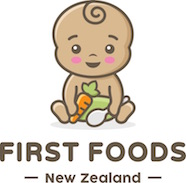Researcher profiles:
- Professor Anne-Louise Heath
- Professor Rachael Taylor
- Dr Jill Haszard
- Associate Professor Lisa Te Morenga
- Dr Cathryn Conlon
- Dr Kathryn Beck
- Mrs Alison Meldrum
- Professor Lisa Houghton
- Alice Cox (PhD candidate)
- Neve McLean (PhD candidate)
What are New Zealand babies eating?
First Foods NZ is an observational cross-sectional study that follows 625 babies aged 7-9 months from the Auckland, Wellington and Dunedin area. The objective of the study is to explore what babies are eating once they move from an exclusively milk diet to solid food. The research team, including researchers from Massey University and Victoria University of Wellington, will measure the babies' nutrient intake (particularly iron levels), and assess the impact of various feeding methods.
As part of this early nutrition study, the Young Foods NZ project looks at what, and how, we feed tamariki under 4 years of age. This will give important information to policy makers so that they can give better advice to New Zealand whānau and communities.
What is the best way to introduce solids?
Squeezable baby food pouches with plastic spouts are described as a mess-free and easy food alternative for babies 'on-the-go', and have gained increasing popularity in New Zealand. However, despite their apparent widespread use, there has been virtually no published research done either in New Zealand or internationally on the possible impacts of these pouches on babies' diets or health. The First Foods NZ study assesses the impact of baby food pouches on babies' growth and dental health.
As part of the study, the research team also assesses the nutrition, health and safety impacts of another method of feeding that's growing in popularity in New Zealand: baby-led weaning. This technique involves giving babies finger foods to feed themselves from about six months on instead of parents spoon-feeding them pureed food and slowly progressing to more textured food.
How will this information be used?
The outcomes of the First Foods NZ study are expected to provide evidence to help the Ministry of Health to update their advice to Plunket and other Well-Child providers on whether, and how, parents should use these relatively new methods of baby feeding.
Join the First Foods NZ study
First Foods research findings
Research finds baby food pouches are sweet and low in iron, University of Otago website, 15 April, 2021

